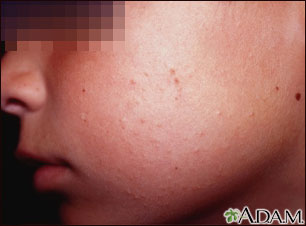The Case for Good Nutrition and Playing Outside... low Folic Acid and Vitamin D Levels Associated with Allergies, Asthma
Two recent studies find interesting associations between lower levels of folic acid and vitamin D and increased allergy/asthma symptoms...
#1) A retrospective study performed at Johns Hopkins and recently published in the Journal of Allergy and Clinical Immunology tracked the effect of folate levels on respiratory and allergic symptoms, as well as levels of the allergic antibody IgE. They reviewed the medical records of over 8000 patients ranging from toddlers to octogenarians. The researchers found that patients with serum folate levels at the higher range of normal had lower rates of high IgE, atopy, and wheeze than those patients with lower levels, even though some of the patients with lower levels were technically within the normal range for serum folate. Bottom line? Folate levels on the high side of normal may be protective against some allergic disease, but blinded prospective studies are needed before we begin recommending supplementation for this purpose alone.
#2) A cross-sectional study published in the May issue of the American Journal of Respiratory and Critical Care Medicine examined the relationship between vitamin D levels and markers of asthma severity in a population of Costa Rican children. Interestingly, low levels of 25-hydroxy vitamin D were found in 28% of the studied children. To me, this was a surprising result in kids who are probably getting plenty of sunlight. Lower levels of vitamin D were associated with increased IgE, eosinophilia, and a 10-log increase in vitamin D levels was found to decrease the odds of recent hospitalization, antiinflammatory medication use, and airway hyperreactivity. Bottom line? There's been a lot of talk about the role of vitamin D in allergy/asthma prevention, and this study certainly supports the concept. However, we are still lacking data on exactly how much supplementation would be needed to prevent allergic disease- it's likely to be more than what's currently recommended for bone health. That said, I still give my baby vitamin D supplementation, and will continue to do so even after he has transitioned to vitamin D fortified milk.
#1) A retrospective study performed at Johns Hopkins and recently published in the Journal of Allergy and Clinical Immunology tracked the effect of folate levels on respiratory and allergic symptoms, as well as levels of the allergic antibody IgE. They reviewed the medical records of over 8000 patients ranging from toddlers to octogenarians. The researchers found that patients with serum folate levels at the higher range of normal had lower rates of high IgE, atopy, and wheeze than those patients with lower levels, even though some of the patients with lower levels were technically within the normal range for serum folate. Bottom line? Folate levels on the high side of normal may be protective against some allergic disease, but blinded prospective studies are needed before we begin recommending supplementation for this purpose alone.
#2) A cross-sectional study published in the May issue of the American Journal of Respiratory and Critical Care Medicine examined the relationship between vitamin D levels and markers of asthma severity in a population of Costa Rican children. Interestingly, low levels of 25-hydroxy vitamin D were found in 28% of the studied children. To me, this was a surprising result in kids who are probably getting plenty of sunlight. Lower levels of vitamin D were associated with increased IgE, eosinophilia, and a 10-log increase in vitamin D levels was found to decrease the odds of recent hospitalization, antiinflammatory medication use, and airway hyperreactivity. Bottom line? There's been a lot of talk about the role of vitamin D in allergy/asthma prevention, and this study certainly supports the concept. However, we are still lacking data on exactly how much supplementation would be needed to prevent allergic disease- it's likely to be more than what's currently recommended for bone health. That said, I still give my baby vitamin D supplementation, and will continue to do so even after he has transitioned to vitamin D fortified milk.


Comments
Post a Comment
Thanks for taking the time to comment on this blog's posts! Let's keep the discussion engaging and free of frivolous advertising or vulgarity. It's a family show, folks!